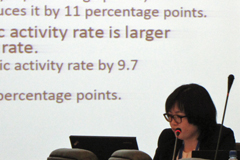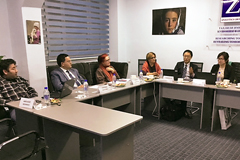JICA-RI Researchers Share Findings of a Study on Remittances and Household Finances in Tajikistan
2019.01.30
JICA Research Institute (JICA-RI) has been conducting a research project called "Study on Remittances and Household Finances in the Philippines and Tajikistan" since 2015 with the aim of determining the impact of migrant workers in other countries on the household finances of their home countries.
As part of the research project, JICA-RI has been a member of the World Bank’s "Listening to Tajikistan" (L2TJK) project since September 2017. The L2TJK is a phone-based high frequency household panel survey of 800 households, which is representative of the nation, and has been implemented since May 2015. In two-week intervals, survey enumerators conduct telephone interviews on themes including income, employment, migration, wellbeing, and services. JICA-RI research fellows Enerelt Murakami and Eiji Yamada added questions regarding migrant workers and overseas remittances into the L2TJK survey instruments to collect migration related data for the JICA-RI research project.
In order to disseminate the JICA-RI research outputs, Murakami participated in the “2nd IZA/HSE Workshop: Ten Years after the Financial Crisis - Labor Market Adjustment in Emerging and Post-Transition Economies” held in Moscow, Russia on Oct. 11-12, 2018. The workshop was hosted jointly by the Institute of Labor Economics (IZA) and the National Research University Higher School of Economics (HSE). The objective of the workshop was to reflect on the impact of the global financial crisis that occurred 10 years ago and to share related research and knowledge to promote higher and fair labor participation of people from emerging and post-transition countries.

JICA-RI research fellow Enerelt Murakami gave a presentation at a meeting held in Moscow
Murakami gave a presentation titled, "The Impact of Migration and Remittances on Labor Supply in Tajikistan" in the session "Issues of Wage Inequality and Labor Supply" held on Oct. 12. In her presentation, Murakami first discussed Tajikistan’s economic conditions since it gained independence from the former Soviet Union in 1991. She explained that, with productivity, growth, and job creation not catching up with rapid population growth, Tajiks are seeking job opportunities abroad. In recent years, about 40% of Tajik households have at least one member who has gone abroad to work, of which about 90% are in Russia. Tajikistan's economy is dependent on workers’ remittances, which have constituted 30-50% of its GDP since 2006.
Based on her research results, Murakami pointed out that larger households with a married, older, and female head tend to send family members abroad. On the other hand, households with handicapped members and children below 18 are less likely to send family members and receive remittances. Further, she indicated that the reservation wage, the lowest wage rate that people are willing to accept to work, has a significant negative impact on the labor market participation of household members remaining in Tajikistan. If a household sends a member, or receives remittances, the labor market participation rate of the members left behind declines by 8 and 11 percentage points respectively. The research findings suggest that migration and remittances raise the reservation wage of the household members remaining in their home country. Murakami further showed that labor supply of the remaining household members are more responsive to remittances than migration.
In addition, Murakami and Yamada traveled to Tajikistan on Nov. 11-16, 2018, and visited related government agencies, municipality offices, local schools, and interviewed households. During the trip, Murakami and Yamada organized a mini workshop inviting representatives and researchers from international and research organizations. At the mini workshop, Murakami presented the findings of her research on the impact of natural disasters on migration decisions and the impact of parental migration on education of children. Yamada presented findings from daily mobility questionnaires in L2TJK, including travel methods, frequency, costs, purposes. This visit allowed them to obtain a large amount of qualitative information to supplement the quantitative data collected through panel studies such as the livelihoods of residents, the division of roles within households, and the relationship between migrant workers and household finances, as well as the difficulties that poor households and schools face.

JICA-RI research fellows Enerelt Murakami (far right) and Eiji Yamada (second from right) discussing their research results

事業事前評価表(地球規模課題対応国際科学技術協力(SATREPS)).国際協力機構 地球環境部 . 防災第一チーム. 1.案件名.国 名: フィリピン共和国.

事業事前評価表(地球規模課題対応国際科学技術協力(SATREPS)).国際協力機構 地球環境部 . 防災第一チーム. 1.案件名.国 名: フィリピン共和国.

事業事前評価表(地球規模課題対応国際科学技術協力(SATREPS)).国際協力機構 地球環境部 . 防災第一チーム. 1.案件名.国 名: フィリピン共和国.

事業事前評価表(地球規模課題対応国際科学技術協力(SATREPS)).国際協力機構 地球環境部 . 防災第一チーム. 1.案件名.国 名: フィリピン共和国.

事業事前評価表(地球規模課題対応国際科学技術協力(SATREPS)).国際協力機構 地球環境部 . 防災第一チーム. 1.案件名.国 名: フィリピン共和国.
scroll